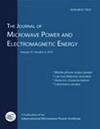编者的话:帮助新一代人看得更远的教科书
IF 1.5
4区 工程技术
Q4 ENGINEERING, CHEMICAL
Journal of Microwave Power and Electromagnetic Energy
Pub Date : 2023-01-02
DOI:10.1080/08327823.2023.2169226
引用次数: 0
摘要
“如果我看得更远一点,那是因为我站在巨人的肩膀上”这句话最著名的来源是艾萨克·牛顿爵士给罗伯特·胡克的一封信,表达了对笛卡尔对光的研究的某种认可。艾萨克·牛顿爵士是卢卡斯教授(他在剑桥大学担任卢卡斯数学教授),所以同样的想法可能不仅仅是巧合,也是另一位卢卡斯教授斯蒂芬·霍金编辑和评论的科学文献汇编的标题的基础,“站在巨人的肩膀上:《物理学和天文学的伟大著作》,讲述了尼古拉斯·哥白尼、伽利略·伽利莱、约翰内斯·开普勒、艾萨克·牛顿爵士和阿尔伯特·爱因斯坦的贡献。提到巨人是一种隐喻,承认前人作为新发现的基础所做的工作的重要性。它不可能是另一种方式,因为文明的兴起依赖于每一代人记住前一代人所学知识的能力。口授法和师徒法是最常见的知识代代相传的方式,但由于容易忘记或误解共同的思想,它们受到了限制。有很多人提到了偶然学习,但与需求驱动的研究相比,这种研究可能是不可能的,在某些学习被遗忘后,随着类似经历的重复和不同世代的重新发明,这种研究可能再次出现。也许写作也是一种需求驱动的发展,所以它是由不同的文化发明的。这是一个巨大的飞跃,因为它使信息能够代代相传,尽管产生信息的人失去或死亡,然后积累知识。这是对那些在无数文献和书籍中留下遗产的古人的认可。有许多因素影响着达到高水平的文化和技术,成为一个文明的路径。知识的产生需要人们做好准备,它不是可用的信息,而是获取数据的方法,通过分析产生信息,然后拥有知识。爬上巨人的肩膀需要一定的能力和技巧,所以成长不是偶然的,因为人们被教导要去寻找和学习。具有创造发明、应用知识和创造知识的必要能力的人,原则上是在教育机构中培养出来的,他们获得了科学和工程专业的学位。在这个过程中,他们必须学习和理解几个世纪以来产生的成熟的知识。教学过程主要取决于学生,学生必须吸收从教授和学习材料中获得的信息。在这个过程中,一个非常重要的辅助工具是每门学科的教科书,因为它们汇编了许多代人保存下来的产生的知识。本文章由计算机程序翻译,如有差异,请以英文原文为准。
Editor’s message: textbooks for helping new generations to see further
The best-known source of the quote ‘If I have seen a little further, it is by standing on the shoulders of giants’ has been taken from a letter of Sir Isaac Newton to Robert Hooke, expressing a sort of recognition to Descartes on his studies of light. Sir Isaac Newton was a Lucasian Professor (he held the Lucasian Chair of Mathematics at the University of Cambridge), so probably it is more than a coincidence that the same idea is the basis of the title of a compilation of scientific texts edited and commented by another Lucasian Professor, Stephen Hawking, ‘On the shoulders of giants: The great works of physics and astronomy’, which is about the contributions of Nicolaus Copernicus, Galileo Galilei, Johannes Kepler, Sir Isaac Newton, and Albert Einstein. The reference to giants is metaphoric, recognizing the importance of the work performed by the predecessors as the base of the new findings. It cannot be another way, as the rise of civilization has depended on the capacity of each generation to remember what was learned by the previous ones. Oral and master-apprentice methods were the most common ways for passing knowledge from generation to generation, but they were limited due to the chances of forgetting or misunderstanding shared thoughts. There are many references to accidental learning, but it is likely improbable compared to needdriven research that could emerge, once again after certain learning is forgotten, with the repetition of similar experiences and reinventions along different generations. Perhaps writing is also a need-driven development so it was invented by different cultures. It was a great leap since it made it possible to transmit information through generations, despite the loss or death of those who generated it, and then have knowledge accumulation. This is the medulla of recognition to ancient people who left their legacy in innumerable documents and books. There are many factors that affect the path to reaching a high level of culture and technology to become a civilization. Knowledge generation requires people prepared to do so, it is not the available information, but the method to get data, produce information through analysis, and then have knowledge. Climbing on the shoulders of giants who left their legacy requires certain abilities and skills, therefore growing up is not fortuitous, as people are taught to seek out, and learn. The people with the necessary abilities to create inventions, apply knowledge, and generate it, are in principle formed in educative institutions, earning their academic degrees in sciences and engineering. During the process, they must learn and understand wellestablished knowledge, which has been produced over centuries. The teaching-learning process mainly depends on the student, who must assimilate the information that receives from the professor and the study material. A very important auxiliary in this process is the textbook of every subject because they compile the generated knowledge preserved over many generations.
求助全文
通过发布文献求助,成功后即可免费获取论文全文。
去求助
来源期刊

Journal of Microwave Power and Electromagnetic Energy
ENGINEERING, CHEMICAL-ENGINEERING, ELECTRICAL & ELECTRONIC
CiteScore
2.50
自引率
6.70%
发文量
21
期刊介绍:
The Journal of the Microwave Power Energy (JMPEE) is a quarterly publication of the International Microwave Power Institute (IMPI), aimed to be one of the primary sources of the most reliable information in the arts and sciences of microwave and RF technology. JMPEE provides space to engineers and researchers for presenting papers about non-communication applications of microwave and RF, mostly industrial, scientific, medical and instrumentation. Topics include, but are not limited to: applications in materials science and nanotechnology, characterization of biological tissues, food industry applications, green chemistry, health and therapeutic applications, microwave chemistry, microwave processing of materials, soil remediation, and waste processing.
 求助内容:
求助内容: 应助结果提醒方式:
应助结果提醒方式:


